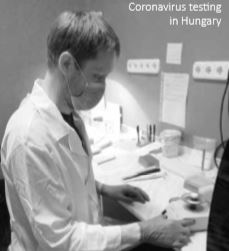The pandemic has highlighted global systematic inequities and failures related to the rights of people with learning disabilities to equitable treatment. Australia is no exception to this.
Health inequities experienced by people with learning disabilities were highlighted at the Royal Commission into Violence, Abuse, Neglect and Exploitation of People with Disability early in 2020. These included barriers faced when accessing and receiving healthcare and services, delayed diagnoses and misdiagnoses, as well as limited life expectancy.
These inequities have become particularly concerning during the pandemic, and were combined with the risk of prejudice and attitudinal biases, which can lead to people having a lower priority for prevention, testing and treatment for Covid-19.
These concerns led to the release of a national position statement signed by numerous groups and individuals, calling for equitable access to Covid-19 prevention, screening and treatment for people with intellectual or developmental disability in March 2020; the statement can be downloaded from https://www.3dn.unsw.edu.au/covid-19.
Another inequity that became strikingly apparent during Covid-19 is that many people with learning disabilities have limited access to the internet and to smart technology, often the result of poverty.
Numerous stakeholders, including self-advocacy groups, have made an enormous effort to move their services and support for people from face-to-face to online space in practically no time. However, they could offer online support only to those with access to the internet.
Indeed, the Covid-19 pandemic highlighted to us that easy and, ideally, free access to the internet should be a basic right for all citizens.
Iva Strnadová is a professor in the School of Education at the University of New South Wales, Sydney
There were concerns that poor health infrastructure in West Africa would mean worse outcomes here than in the rest of the world.
So far, for reasons not fully understood, Ghana has had lower rates of infection and less severity than Europe. Life for many after some initial local lockdowns has continued fairly normally – although with restrictions on the usually large gatherings at funerals and weddings.
Posters and health promotions advising “Don’t shake hands, wear nose masks and wash hands” have been the main means of combating the spread.
Adults at a residential centre in the capital Accra had differing experiences. Education facilities were closed, and the centre went into quarantine in March. Some went home to families, and told us they were bored and missing their friends.

Those left were allowed to go out only occasionally with face masks and close supervision. There were no visitors, so there was little activity apart from cooking, washing and personal care. For those with the highest support needs, there was no mixing between dormitories and no going out. This has now been relaxed to allow walks and activities in the grounds. The centre has remained Covid free.
Some have taken up opportunities to work in the kitchen or lead the worship, as the more able members who usually did these have gone home.
Supplying Veronica buckets (to provide running water) and occasional visits by social workers to check that the advice is understood appear to be the only specific government support.
Jane Abraham is an involvement worker at Lambeth Learning Disabilities Assembly who now mainly supports selfadvocates in Ghana
Health and social services are both provincial responsibilities so it is difficult to speak of a Canadian response. I will outline some key responses and issues.
A federal disability advisory group was formed early on and was involved in key policy decisions, notably on triage. The federal government created a one-time Can$600 (£350) grant for Canadians with disabilities. In addition, the National Statistics Agency has tracked how disabled people have been coping with the pandemic.
British Columbia had one of the better responses both to the virus and with regards to disability. A ministerial disability advisory group was formed, which met the minister and his staff monthly.
Hospital visits were a major issue. Initially, no visitors were allowed, which left people with intellectual disabilities isolated and vulnerable. Through strong advocacy efforts, an exemption for people with intellectual disabilities was established so family or others could be with them. British Columbia also immediately raised the monthly disability benefit by Can$300 (£175).
Other concerns included how to support families with children at home when programmes shut down and support workers were not able to visit them. Access to personal protective equipment was also an issue.
While neither of these were fully or quickly addressed, programme modifications and extra funding for families and different types of residential accommodation provided some relief.
Here, as in many jurisdictions, Covid-19 has exposed the precarity and vulnerability of people with disabilities. However, it also provided a platform to call for major systemic reform well beyond the pandemic.
Tim Stainton is director of the Centre for Inclusion and Citizenship at the University of British Columbia, Vancouver
One family’s story illustrates the pandemic’s impact here. The mother (who gave the account) is a teaching assistant at her daughter’s school, her husband a laser programmer. Their daughter has learning disabilities and epilepsy, and they have a teenage son.
“Our daughter has no idea about the concept of time and lives in the present. This has made the Covid pandemic easier for us.
“I am used to being at home. We spend a lot of time together without any problems. Paradoxically, an advantage for us is that we do not have many social activities.
“We did not particularly emphasise the existence of Covid to our daughter. Through constant warning and supervision, I taught her to observe hygiene in stores. “We found a procedure for washing hands in a fun way online. My daughter always asks if she will have to wear a mask at a specific place or event, and will put it on herself once told.
“We encountered challenges. The care of our daughter lies primarily with us. We waited a long time for our Covid tests.
“When both of us were sick, we were most worried about what would happen with the children in the event of our hospitalisation. We could find no information and nor could our GP or paediatrician. What really scared us was the lack of information for patients. Without the internet, we would have been lost.
“We are used to taking care of ourselves, but this has alerted us to the need to prepare for such a situation.”
Monika Mužáková is an associate professor in the Faculty of Education, Charles University, Prague. Translation by Iva Strnadová
People with learning disabilities have told us they feel forgotten by the government. While a lot has been said about older people and the support they need, we know many disabled adults feel excluded from plans or guidance.
People with learning disabilities are confused as rules and guidelines have changed so often. There is a lack of support from the government and easy-to-understand official and media information. Families and paid supporters feel they have been ignored too.
We have heard a lot of stories, though, of how self-advocacy and community groups have helped their members and each other.
At the beginning of the outbreak, some people with learning disabilities in England had “do not resuscitate” notices put on them without them knowing or just
because they had a learning disability. We know this has made some people feel their lives are not valued and afraid of needing medical help.
People with learning disabilities have been affected by coronavirus more. Information has not yet been properly published by the government in an accessible format even though we know people with learning disabilities died at a rate 4-5 times more than other people.
People, families and paid supporters all want better information so they can understand what will help people be safe and live a good life as coronavirus carries on. They want good support too.
Samantha Clark is chief executive and Gary Bourlet is membership and engagement lead and self-advocacy spokesperson at Learning Disability England
A survey on Covid-19 mortality in care homes for senior citizens was published in Austria in 2020 but findings regarding any kind of accommodation for persons with disabilities were absent.
This illustrates the low significance of persons with disabilities during the lockdown. They were overlooked – their situation was not a public issue. No one asked how disabled adults or children and their families coped with the unpredicted breakdown of support services.
Recently, some non-governmental organisations went public to talk about the problems experienced by people with high support needs or families providing 24-hour care for those with profound disabilities with no support from outside.
Later, it became obvious that most people living in institutions had been subjected to much harsher restrictions than others. Some had been locked in for months, such as a six-year-old girl whose case was reported in the press, who suffered tremendously because her relatives were not allowed to meet her for weeks.
In July, the Austrian self-advocates’ network published a statement confirming this and demanding that people with disabilities were considered and involved in all future efforts to fight the pandemic.
Petra Flieger is an independent researcher in Vienna and Tyrol
In the US, the impact of the pandemic crisis on individuals with intellectual disabilities and their families can be seen in many ways as simply a specialised version of the critical difficulties faced by other people.
The problems experienced by people with disabilities are the problems of the isolated, the unemployed, the chronically ill and the undereducated – stuck at home, unclear about the rules, deprived of contact with friends and family and with no end in sight for the daily disruption.
However, reports and experiences from within the disability community show that, while they are similar to other groups in many ways, people with intellectual disabilities are dealing with particularly troubling circumstances.
As one advocate put it to me, the “one thing we deeply felt was that, as turmoil and changes hit, policy went straight to ableism”. Reports emerged of doctors and hospitals using the label of intellectual disability, in itself, as a justification to end or never begin intensive care protocols.
Some schools asked for waivers from legal obligations to provide education programmes for children with complex
learning and behavioural needs. Some large care facilities severely limited contact with family or outside support professionals.
However, in the midst of this discrimination and excessive risk, glimmers of hope have started to shine. It took a pandemic to learn that online technology opens up ever greater possibilities for independence and communication. The advantages of smaller living arrangements over large, congregate facilities have become even clearer. In the midst of pandemic, community persists.
Philip Ferguson is professor emeritus at Chapman University in Orange, California
In Hungary, more than 20,000 disabled people live in institutions because of a lack of community services. The pandemic has increased their segregation and reinforced the urgency of deinstitutionalisation.
By August, of the 614 people who died as a result of Covid-19, 142 lived in social care settings and figures have continued to rise. There are no figures yet on deaths of people with learning disabilities. Residents of institutions have been banned from going out or receiving visitors yet some of these have still become Covid-19 hotspots.
People with learning disabilities have paid a very high price. Lockdown and isolation have harmed mental health, and keeping in touch with family and friends has become very difficult. Support for the mental wellbeing of residents and staff has received no government help or attention.
Many institutions have turned to external partners for support. Advocacy body ÉFOÉSZ has been organising virtual events for their residents, and providing free equipment for those who need it. Temporary support or care has not been made available for people living with families if a family carer is hospitalised. Some people with learning disabilities and autism find it difficult to wear a mask, which is compulsory on public transport and in shops. People not wearing a mask are fined – we have asked the authorities for exemptions from fines in these cases.
We have been regularly creating and sharing easy-read and accessible news and information about the pandemic on our website and social media.
Tibor Czakó is self-advocacy coordinator and Ilona Sallai is a self-advocate and advocacy consultant at ÉFOÉSZ, the Hungarian Association for Persons with Intellectual Disability. Translated by Agnes Turnpenny
By early 2020, the Taiwanese government had quickly established measures to control the spread of Covid-19, having learned vital lessons from the outbreak of severe acute respiratory syndrome (SARS) in 2003. There had been only 550 infections and seven confirmed deaths by late October, and no new cases since early April.
So far, no people with learning disabilities are known to have been infected. Until September, users of different services were not allowed to contact one another to prevent infection from spreading between groups. Some local authorities have issued easy-read manuals so people can learn how to protect themselves and avoid infection.

If a person is confirmed as infected, they will be hospitalised for treatment and the residential setting will be locked down. Staff and volunteers who have received specialist training are the only care staff who can work for people asked to stay in quarantine.
Since January, local authorities have delivered masks daily to service users and staff in residential and day care settings. All service users and staff are required to measure their temperature daily. People have learned to wash their hands using “the seven easy steps”. All visitors must measure their temperature, clean their hands and leave their phone number.
Despite Taiwan being hailed for its coronavirus prevention strategy, generally Taiwanese disabled people are not satisfied with the government, as many prevention and support measures were not initially included and the government started to pay attention to disabled people’s needs only after campaigns by them between March and May.
Yueh-Ching Chou is a professor in the Institute of Health and Welfare Policy, National Yang-Ming University, Taipei; Bau-Ju Chen is a retired learning disability day/residential care service centre manager and is now a freelance supervisor
When Hong Kong people were enjoying their Chinese New Year holidays in late January 2020, the government suddenly announced that special schools and almost all community, vocational and residential services would be suspended after the holidays.
Tens of thousands of people with learning disabilities and their families suffered from this unexpected measure, as they were forced to stay at home without help.
Unfortunately, service providers were unable to make timely contingency arrangements for maintaining support to service users, as they had not received any messages from the government before the holidays regarding social distancing measures.
The scarcity of living space in Hong Kong has made the lives of people with learning disabilities even harder during the pandemic. While services were suspended, caregivers reported that round-the-clock caring and management of behaviour in small flats caused them and their children to “fight like cornered beasts”.
A comparison of two studies conducted by a local policy-maker in February and August showed that family conflicts and emotional outbursts were more frequent in August
Service providers created opportunities to address this unprecedented reduction in support for people with learning disabilities. Lacking additional resources from the government, some NGOs successfully procured donations of surgical masks and hand sanitiser for service users, as well as smartphones that staff could use to keep in contact with them.
Besides sending tips and information on Covid-19 via messaging applications, practitioners also produced tailor-made videos coaching people on exercises and reminding them about personal hygiene.
Phyllis King Shui Wong is an assistant professor in the Department of Social Work at the Chinese University of Hong Kong










